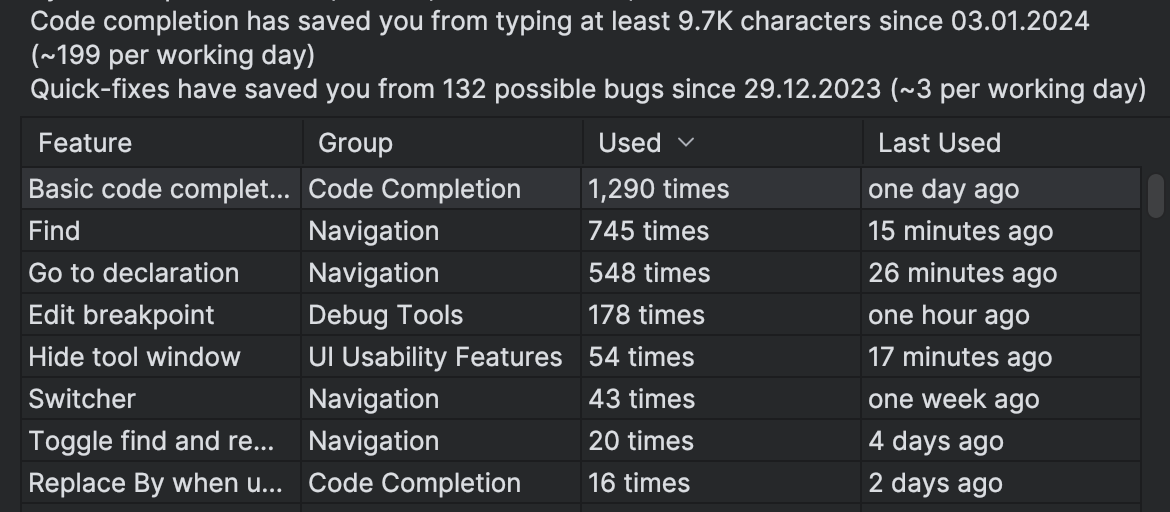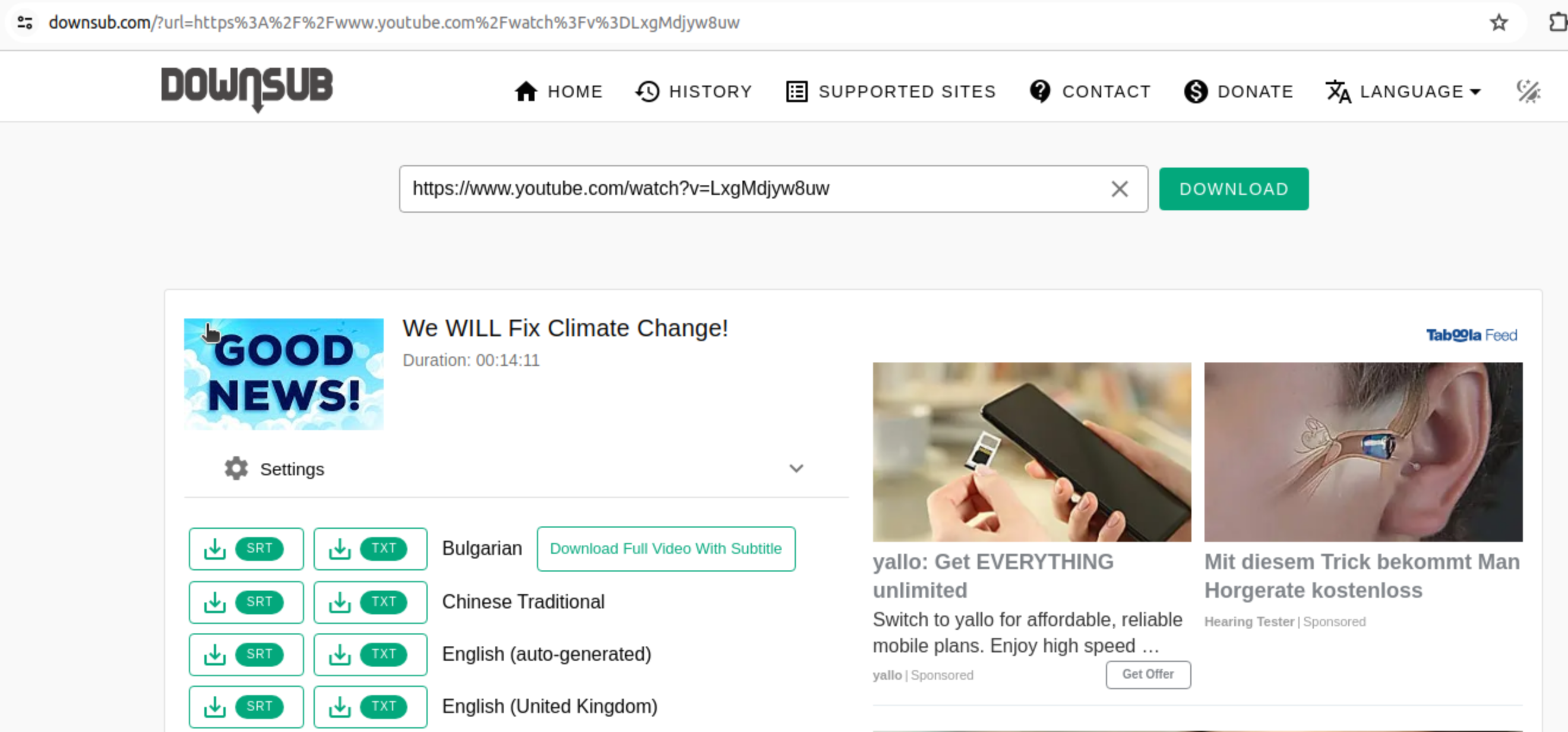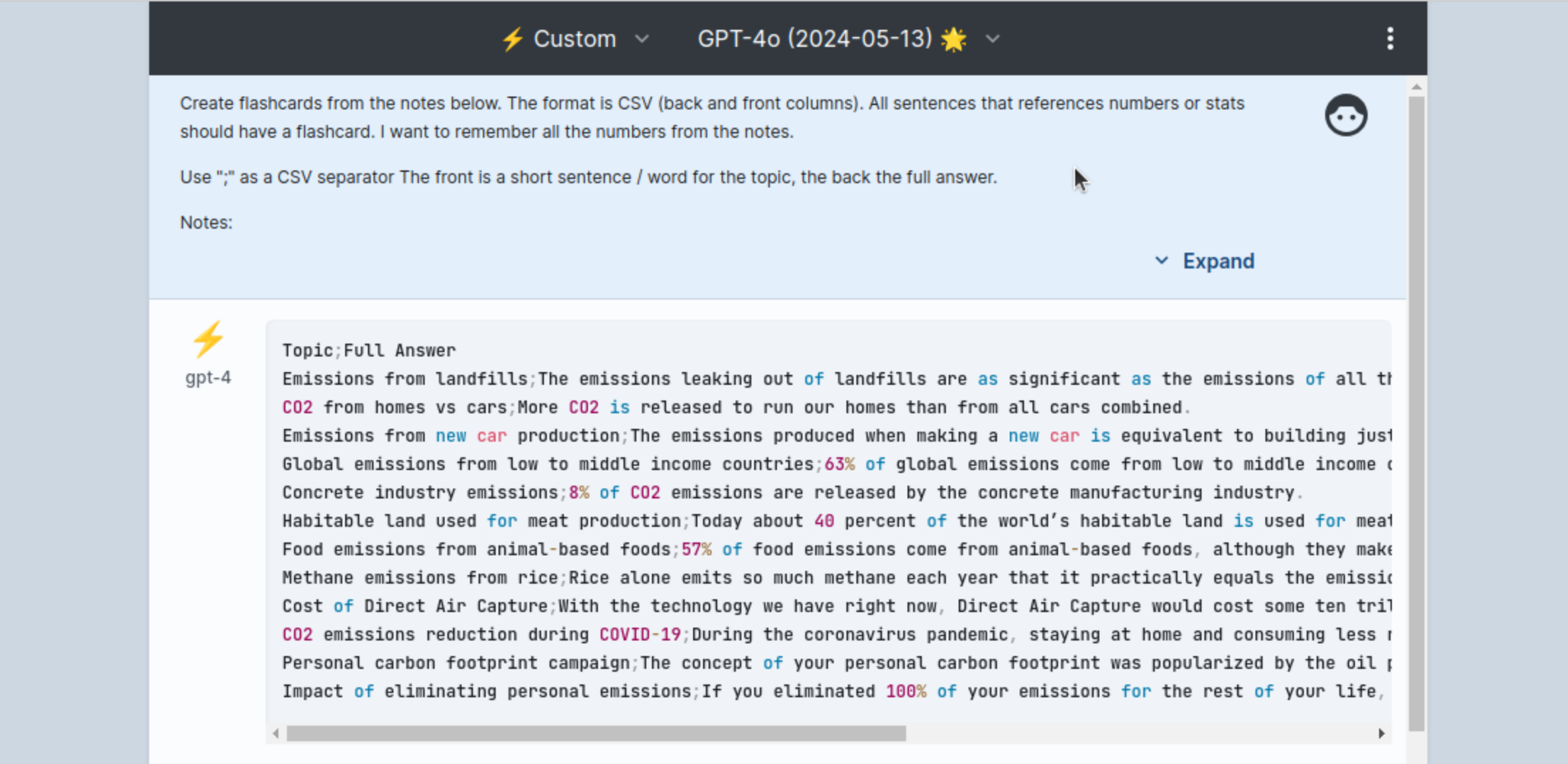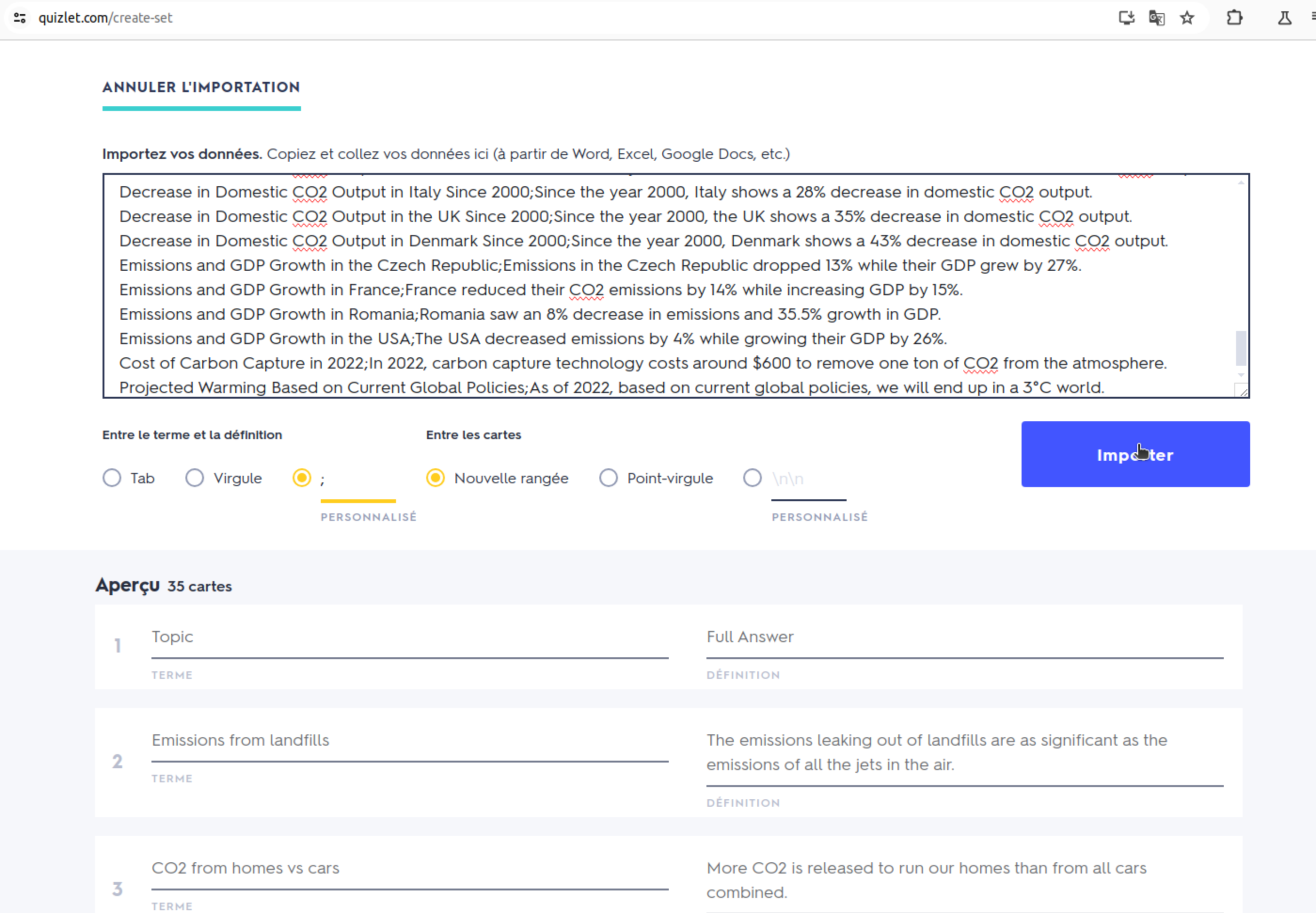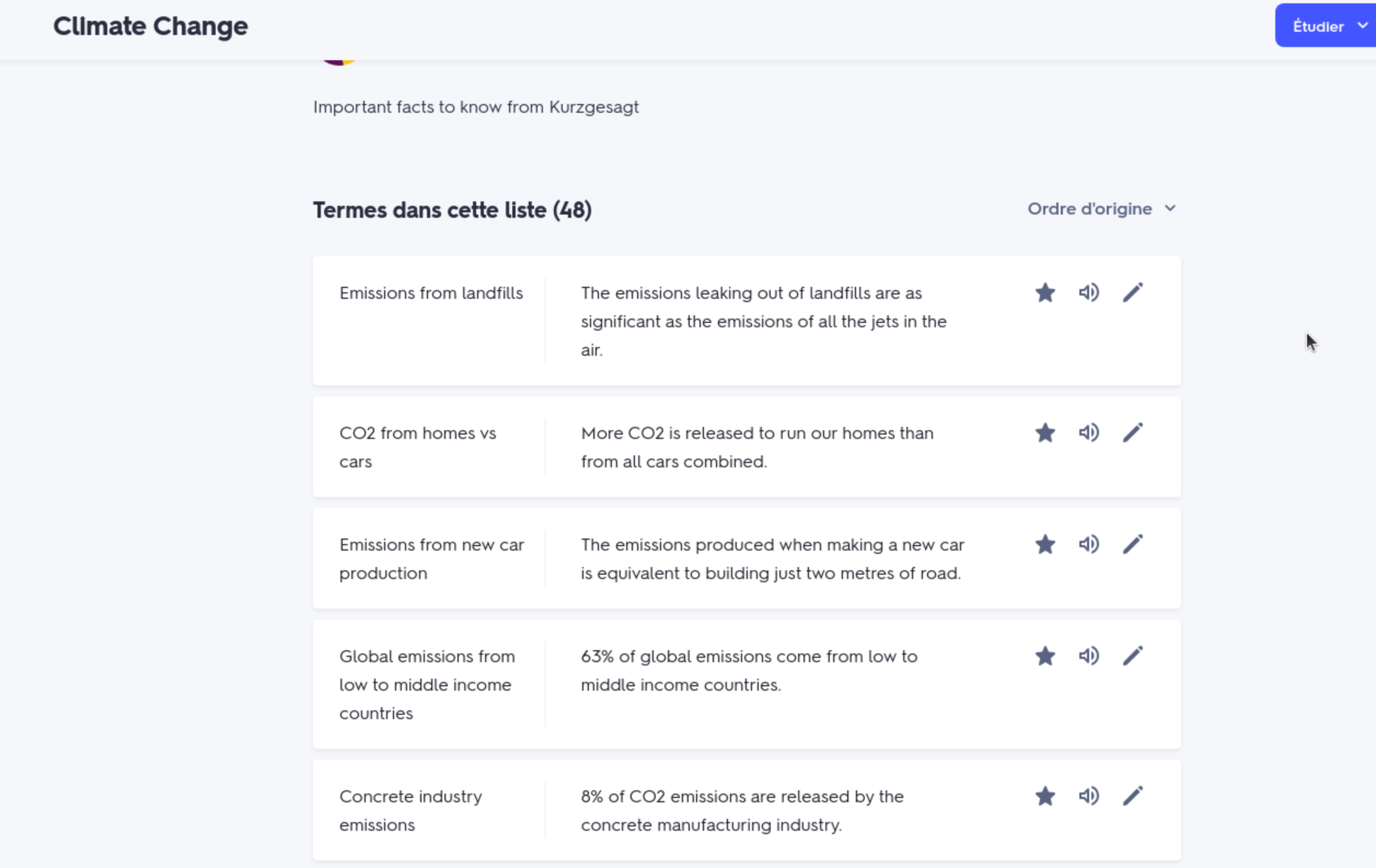Mastering Modern Issues: A Guide to In-Depth Learning in 2024
Mastering Modern Issues: A Guide to In-Depth Learning in 2024
Leveraging current tools
The tools we have in 2024 make it easier than ever to keep learning. It is now straightforward to feed notes to expert systems and output flashcards in custom format, or expand on difficult concepts or help with memorization.
While you’re not likely to learn anything novel in this article, I still felt it could be of some value to share my workflow using LLM after I read this article claiming most people did not use LLMs at all.
Of course LLMs have gigantic shortcomings:
- Hallucinations.
- Confidently gaslight you.
- Factual inaccuracies
- …
However, those problems are not reasons to not use these tools at all. We just have to understand them and use them right.
Since January 2023, I’ve used ChatGPT quite a lot:
- Total user messages across all conversations: 5930
- Total conversations: 816
This is not counting my usage of Claude, nor Github Copilot.
In-Depth Learning of Modern Issues
It’s easy to skim through news headlines and form opinions based on surface-level information. However, this often leads to misconceptions and a shallow understanding of complex issues.
To truly grasp the nuances of any topic, we kind of have to jump head first into the rabbit hole. For many of us with a college education, the last time we studied a wide range of subjects in depth was before graduation. Once we enter professional life, we tend to specialize and often stop learning comprehensively.
What’s more, we often neglect to update our knowledge, clinging to the same understanding we had a decade ago, even as the world and the scientific community’s insights evolve rapidly.
Take, for example, the popular trend of buying local food to reduce carbon footprints. While this idea has its merits, it often overlooks some critical facts. For instance, food transport primarily occurs on freight ships, which are incredibly efficient in constrast to popular belief. Shipping 1 kg of avocados from South America to Europe generates about 0.3 kg of CO2 equivalent in transport emissions and around 2.5 kg overall. In contrast, 1 kg of beef from your local butcher can produce at least 18 kg of CO2 equivalent (I would bet you didn’t know that ;)).
We are not comparing apples to oranges, but highlighting the fact that “buying local” is an oversimplification, and having a broader undestanding of things might help put things into perspective.
Learning Algorithm
- Start with Quick, Digestible Content: Begin with easy-to-understand resources like YouTube videos. This helps build a high-level understanding of the topic and introduces domain-specific vocabulary.
- Break Down the Topic: Divide the subject into smaller, manageable parts, similar to a course outline.
- Identify Reputable Sources: List credible sources for each part of the topic.
- Read and Summarize: Read articles, dissect the information, summarize key points, and take detailed notes.
- Explore Deeply: Don’t be afraid to dive into rabbit holes; exploring related subtopics can build broad AND deep understanding.
- Reflect and Prioritize: Reflect on what you’ve learned and assign “weights” to each concept to identify the most important ones.
- Reinforce Your Memory: Prevent forgetting by revisiting the subject periodically or creating flashcards.
- Engage in Discussions: Debate the topic with others to identify any gaps or flaws in your understanding.
- Iterative process: Knowledge evolves, and so do we. Acquiring knowledge in other domains might help tackle more difficult topics later that once seemed out of reach.
Learning Tools in 2024
Here are some tools I use and love:
- Google Scholar: Search for academic papers to grasp the current scientific consensus.
- Summarize.tech: Website that summarizes YouTube videos from a URL (short and detailed summaries).
- LLMs like ChatGPT: Not used as a source of truth due to the obvious shortcomings, but instead used for its capabilities to help summarize, explain, rephrase and change data from one format to another.
- Modern Flashcard Apps: Apps like Quizlet make it easy to remember information. They use spaced repetition systems and interactive learning to help you retain facts. Flashcards can be created in bulk by importing a CSV file.
Applied Example: Learning Facts About Climate Change
Let’s look at a practical and simple example to learn about climate change and build an initial understanding of the topics as we currently understand it.
-
Watch Kurzgesagt Videos: Kurzgesagt makes great videos on many topics, including climate change. Their videos are well-researched and easy to understand, and the sources they used for their analysis are present in the video description, along a written article posted on Medium.
-
Download Subtitles: Use a tool like DownSub to download the subtitles of the video. This gives you a written version of the more accessible content.
- Generate Flashcards with ChatGPT:
- Paste the downloaded subtitles into ChatGPT.
- Ask ChatGPT to create flashcards, making sure to create a flashcard for every important but hard to recall fact such as numbers.
- Request the output in CSV format with a “;” separator.
- Import into Quizlet:
- Copy the CSV result.
- Use Quizlet’s import feature to create a deck of flashcards.
- Practice daily to reinforce your memory.
- Specialization:
- Go through the main sources cited in the video, and use ChatGPT with this simple but powerful prompt:
explain the article below 3 times, start with a simple explanation and each time increment the accuracy / complexity. - Support the facts by searching Google Scholar for peer-reviewed articles or academic papers, especially those that debunk any of the sources.
- Enhance your flashcards with the new information.
- Repeat the process!
- Go through the main sources cited in the video, and use ChatGPT with this simple but powerful prompt:
Conclusion
This method is great for remembering facts, but it’s obviously not enough for deep understanding or critical thinking. To really understand a topic like climate change, you need to read the sources, check the information, read books and think about it critically, question what you learn and discuss it with knowledgeable people to highlight any blindspot you may have!
